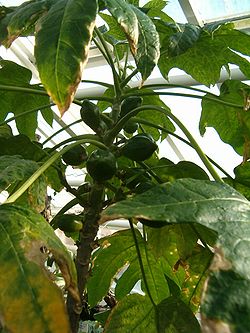| Vasconcellea | |
|---|---|
 | |
| Vasconcellea monoica with immature fruit | |
| Scientific classification | |
| Kingdom: | Plantae |
| Clade: | Tracheophytes |
| Clade: | Angiosperms |
| Clade: | Eudicots |
| Clade: | Rosids |
| Order: | Brassicales |
| Family: | Caricaceae |
| Genus: | Vasconcellea A.St.-Hil. |
| Species | |
See text | |
Vasconcellea is a genus with 26 species of flowering plants in the family Caricaceae. Most were formerly treated in the genus Carica , but have been split out on genetic evidence. The genus name has also been incorrectly spelled "Vasconcella".
They are evergreen pachycaul shrubs or small trees growing to 5 m tall, native to tropical South America. Many have edible fruit similar to the closely related papaya, and some are widely cultivated in South America.
- Species
- Vasconcellea badilloi
- Vasconcellea candicans
- Vasconcellea carvalhoae
- Vasconcellea cauliflora
- Vasconcellea chachapoyensis
- Vasconcellea chilensis
- Vasconcellea crassipetala
- Vasconcellea glandulosa
- Vasconcellea goudotiana
- Vasconcellea heilbornii
- Vasconcellea horovitziana
- Vasconcellea joseromeroi
- Vasconcellea jossei
- Vasconcellea lanceolata
- Vasconcellea longiflora
- Vasconcellea microcarpa
- Vasconcellea monoica
- Vasconcellea omnilingua
- Vasconcellea palandensis
- Vasconcellea parviflora
- Vasconcellea pentalobis
- Vasconcellea peruviensis
- Vasconcellea pubescens (Syn. Vasconcellea cundinamarcensis) (mountain papaya)
- Vasconcellea pulchra
- Vasconcellea quercifolia
- Vasconcellea sphaerocarpa
- Vasconcellea sprucei
- Vasconcellea stipulata
- Vasconcellea weberbaueri
- Hybrids